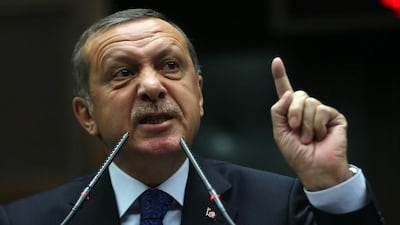During March 21 Nowruz celebrations, a letter from jailed Kurdistan Workers’ Party (PKK) leader Abdullah Ocalan was read out to supporters in which he once again called for the PKK to move towards disarming. Though not the peace breakthrough the government wanted, Ocalan’s message did show that the PKK is invested in making work its negotiations with the Turkish government to end a decades-long insurgency. Unfortunately, the occasion has been overshadowed by other developments that will affect the peace process.
Firstly, when Recep Tayyip Erdogan was elected president last year, he was constitutionally required to cut ties with the governing Justice and Development Party (AKP), which he had led for more than a decade. But Mr Erdogan has been unapologetic about his partisan efforts to dictate government and party policy.
He sees this as something of a stopgap. His aim is for a new constitution that will shift power to his presidency.
To do so, Mr Erdogan must hope the AKP wins enough seats in the June general election to form another majority government. He will also need to keep control of the AKP.
However, government officials have begun to criticise Mr Erdogan’s interventions. His loyalists, meanwhile, have struck back at the critics. For what is the most successful political party in Turkish history, such public recriminations are unprecedented.
Second, it is clear Mr Erdogan has worked out that negotiations with the PKK will be a liability in June. Though the peace bid is his policy, Mr Erdogan worries, correctly, that negotiations with the PKK will alienate Turkish nationalist voters, for whom any dealings with the PKK are anathema.
Mr Erdogan needs the AKP to win more than a parliamentary majority in June. To get the executive powers he wants, he needs his former party to win enough seats to either unilaterally amend the constitution or put a new law to a national referendum. Though he is constitutionally barred from campaigning, Mr Erdogan is going out of his way to court and keep Turkish nationalist votes for the AKP by diminishing Kurdish claims, denouncing Ocalan, and slamming Selahattin Demirtas, leader of the PKK-affiliated People’s Democratic Party.
Third, Mr Demirtas has recently clarified that his party will have no part in facilitating Mr Erdogan’s bid for an executive presidency.
There has been speculation that if the AKP failed to win enough seats to unilaterally rewrite the constitution, the party could turn to Mr Demirtas’s party and offer significant concessions in exchange for its backing of a new constitution. For his part, Mr Demirtas has vowed this will never happen.
These developments suggest several questions to guide observers.
One, how much does the drive for votes damage the negotiations with Ocalan? Both sides know the run-up to elections is going to be brutal. It will take careful nursing to ensure the bruising is temporary.
Two, if Mr Demirtas won’t play constitutional kingmaker, what is the Kurdish side offering government negotiators other than disarmament? It is difficult to see how the Kurds can get the concessions they want – autonomy and freedom for Ocalan – just by disarming.
Three, is Mr Erdogan’s plan for an executive presidency impractical? His former party is split. Help from Mr Demirtas is not forthcoming. But the Kurdish “question” can only really be settled by writing a new constitution.
It is difficult to imagine Mr Erdogan signing a new constitution that preserves the parliamentary system. But without a new constitution the country’s fundamental problems cannot be solved.
Caleb Lauer is a freelance journalist who covers Turkey

